Amo Raju on ‘Walk Like A Man’ & Disability Stigma
Campaigner, politician and writer, Amo Raju, is a formidable name in delivering support for those with disabilities in Derby, UK.
The inspiring entrepreneur is a catalyst in aiding disabled people to get integrated into society.
In 1998, he became the CEO of Disability Direct, a charity that “facilitate independent living opportunities for disabled people.”
Not only does this highlight Amo’s tremendous work rate but his compassionate ethos towards those around him.
His uplifting work has broken down many barriers for communities and his success has infiltrated the literary landscape.
The British Asian author released his monumental debut book, Walk Like A Man in October 2021.
The novel is a semi-autobiographical tale. It surrounds the protagonist AJ, who tries to navigate through a world that is not designed for those with a disability.
Amo Raju’s motivation for writing this book has come from his own personal journey with depression and cerebral palsy.
The latter is a lifelong condition that affects movement and coordination. However, this did not deter Amo from his life ambition to shed more light on the underrepresented.
Therefore, the book is a heartening insight into the life of someone battling with internal and external conflicts.
The novel evokes incredible emotion and is a profound yet refreshing exploration of men’s mental health.
Enlisting the help of blogger and writer, Mani Hayre, Amo was able to retell some of his life experiences through AJ in this mesmerising novel.
Mani, who co-authored the book, wonderfully gauged AJ’s journey whilst highlighting other focal points such as women and therapy.
Additionally, the relatability the reader feels towards the characters is unparalleled.
The way the words entice your attention and shed a light on topics considered taboo in South Asian communities is incredibly poignant.
DESIblitz caught up with Amo Raju to talk about Walk Like A Man, the messages within the book, and overcoming mental and physical obstacles.
Can you tell us a bit about yourself?
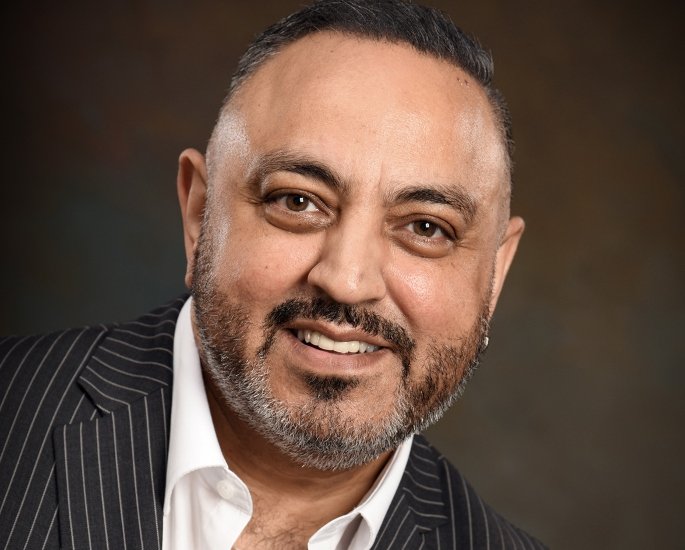
I’m afraid the story of my upbringing is pretty mainstream but with all the Punjabi trimmings.
Dad went to work all hours, mother was the housewife with the extended family playing all their expected roles.
I’m the first generation born in the UK hence, like many, I had the best and worst of both cultures, leaving me to try and work out where I belong!
My only added issue was the fact that I was born with cerebral palsy. Something which of course challenged me but also everyone around me.
“I was able to walk but it was a very different walk.”
I’ve been married for many years and have grown-up children and I am now a grandfather too.
Yes, I know I look too young to be a grandad but that’s just years of facial moisturising!
What motivated you to write ‘Walk Like A Man’?
It wasn’t so much motivation but more about those around me.
They insisted that I log my experiences as a disabled person from the Asian community.
For years, I’ve been told that the events in my life are incredible and will be of interest to future generations. The truth is, I’ve been so busy living it.
I only truly started reflecting on it over the last two to three years and that was when I felt the urge to begin to share.
What is the importance of the title and the themes of the book?
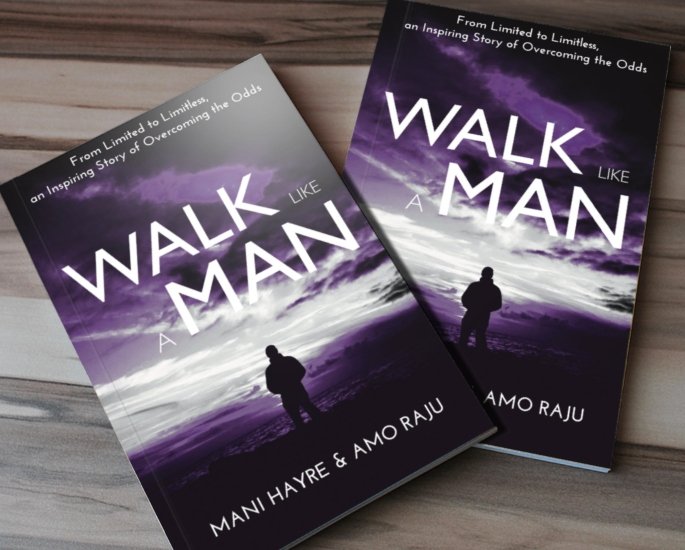
The main theme is about the character’s (AJ’s) relationship with depression and his visits over three decades to his therapist, Dr Sonia Khan.
Depression and disability – such taboo subjects in our community, particularly in men.
We’re not good at talking about whatever is on our minds, which is normally bottled up until we traditionally lash out at the innocent bodies around us.
It wasn’t really until we were halfway through writing the book that the title came to me. Before that, I was more focused on recalling my experiences.
As the story took shape, without sounding too cliché, it came to me in a dream and that was it. It clicked into place!
“As men, we are expected to stand tall in every situation.”
When the going gets tough and without sounding sexist, women are traditionally more able to express their feelings through tears.
The norm has been for men to ‘deal with it’ and ‘walk it off’ regardless of how things are destroying us internally.
The other themes include how the Asian community reacts to disability and wants to pigeonhole people into expected roles. Also, the concept of therapy is explored in the book.
If I say so myself, the complicated exchanges between AJ and Sonia go a long way in bringing counselling to the surface with the hope to it becoming the societal norm.
Tell us about AJ’s battles and the impact of addressing them?
He certainly is a conflicted character and is based totally on me. His mannerisms, his anger, pain and frustration.
According to those who know me well, they are quite impressed about how we have managed to capture my character and place him into 82,000 words.
However, the character resonates so well with so many people.
I was chatting to someone who I’d never met before but who had just finished the book. They particularly liked how AJ would be having two conversations simultaneously.
One with whoever he was with and one based on his real thoughts taking place in a separate narration in his head. I know we all do it.
In a nutshell, AJ was a bhangra singer, then unemployed, then a volunteer, then part-time employee, then manager, and eventually became a CEO.
Additionally, he had a stint in politics too as a councillor and cabinet member.
All these experiences went against the grain in what was expected from him as a child where he had pretty much been written off.
Without giving too much away from the book, AJ’s main battle is with those around him. Particularly their reactions to his disability and then how he reacts to their behaviour.
Like me, he has triumphed on many occasions but not without cost to his mental and physical health.
Why was it important to share parts of your story using this medium?
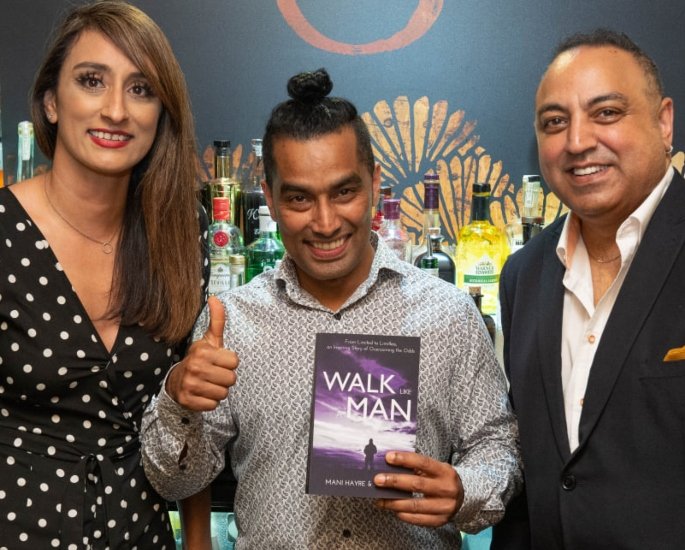
I wasn’t overly keen on writing something, which was a chronological account of my life.
I wanted to write a good story, which as it does, takes the reader on a number of journeys with relatable emotions.
But I can assure you though, apart from the first and last chapter, the text on every single page originates from an actual event in my life.
Additionally, my family are not necessarily in the book as unlike me, they are quite private people.
“Readers will learn that I have had to be a little more loud and visible to survive.”
For the romantics, Mrs Raju’s character does make a welcome appearance at the end.
Who do you want the book to specifically target and why?
In all honesty, I didn’t have the background of the reader in mind as I think there’s much in the book for everyone.
However, so far, I’m encouraged by the feedback from men. They were a natural target but I expected their interest in Walk Like A Man to rise organically.
As it stands, male and female readers appear to be neck and neck in terms of numbers.
Nevertheless, the reviews on Amazon also depict how women can equally relate to AJ’s frustrations.
Overall, I want society to take a good look at itself and encourage and support characters like AJ, and equally celebrate the need for a ‘Sonia’ for every AJ too.
Were there any challenging moments when writing the book?
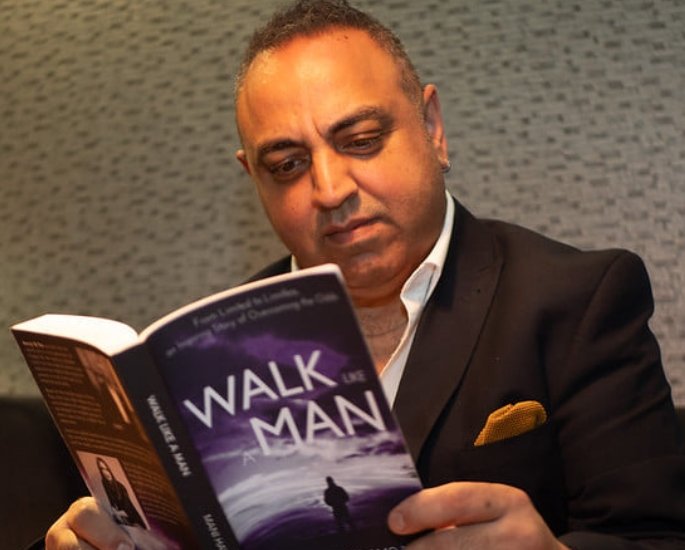
Good question indeed! One of my frustrations was not being able to get more examples of my life in the book. But on reflection, it would have had to be spread over two volumes.
I think an unexpected outcome was how I felt after recalling each event with my co-writer, Mani.
For six months, we would meet over Zoom on a weekly basis, where I would open up about events and incidents, which affected me.
“I realised quite soon how I found each discussion to be either cathartic, draining or simply too emotional.”
On occasion I would feel like I’m back in that dark place that AJ visited so often, only to realise that talking with Mani actually helped me open up even more than I expected.
What stigmas/barriers are you hoping to break down with the book?
It goes without saying that I want to address the imbalance we have in society when it comes to recognising depression.
But more importantly, I want people to feel comfortable in asking if someone is ok.
One of the lines in the book is – “sometimes the loudest one in the pub or the office is also the quietest one at home and quite possibly at risk.”
There are so many messages in the book but if we just remember this one, I will be happy.
I think I would also like to destroy the notion that it is a sign of weakness to ask for counselling or therapy.
Walk Like A Man will hopefully demonstrate the benefits of reaching out to someone.
In AJ’s case, it was his GP but technically anyone can be that first set of ears.
It’s recently become a bit of a mission of mine to stand up to the Asian community when it practises medieval beliefs around disability.
I’m really encouraged to see a younger generation of disabled people from the Asian community take to social media and call out ignorant attitudes.
Thanks to Walk Like A Man I’m teaming up with the ‘Chronically Brown’ movement whose hashtag #desiabled is just fantastic!
What was it like working with Mani Hayre?
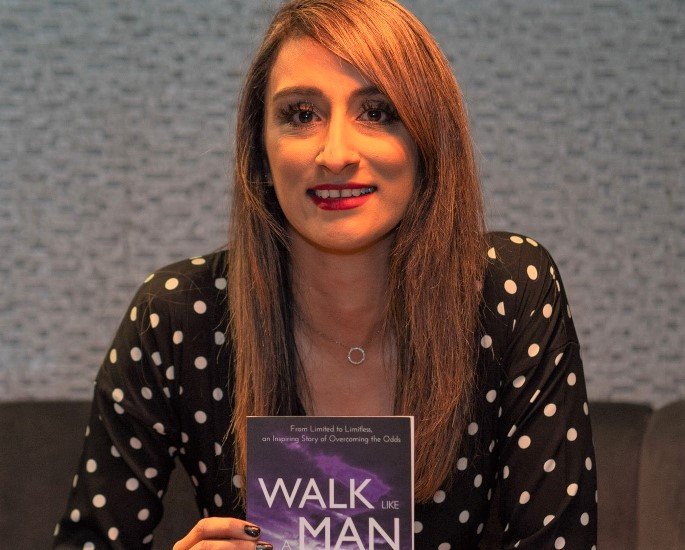
Mani was God sent! The truth is, I wouldn’t have gotten past chapter four without her.
Her miraculous appearance on my feed on LinkedIn made me realise that she was the matching raw talent I need to see the project to fruition.
As Mani was equally quite vocal about her relationship with mental health and our community, the connection became strong within minutes of us talking to each other.
An overwhelming realisation as we wrote the book was how much AJ surrounded himself with strong female characters who ensured he stayed on track.
“Mani too is a strong woman who soon learnt not to take any bull from me.”
As I said earlier, I wanted a few more chapters in the book but Mani was firm in her objection and kept me focussed on the end goal.
I think people will see more brilliance from Mani in the future.
Are South Asians doing enough to tackle mental health/disability stigma?
Not at all. The truth is, society as a whole is still not geared up to act on the growing need for mental health support.
In South Asian communities, the challenge appears on many levels.
Our communities are still fixated with the concept of ‘what will people say?’ if anyone found out someone from their family receives counselling.
I’ve also noted so many from our older communities who are religiously taking anti-depressants. I’m more of an advocate for counselling before drugs as was the case with AJ.
Obviously, more funding needs to be channelled to mental health services.
Yet, this will only benefit our communities if we own and acknowledge the need. If we aren’t too busy popping pills or denying it exists in the first place.
The South Asian community has a long journey to take in getting to an acceptable point where it supports disabled people.
In my experience, I believed I was probably not going to be worthy of anyone’s daughter for marriage. Or, I needed to be cured rather than society working to support my needs.
Both are beliefs that are still held firmly by those from the subcontinent today as was the case over 30 years ago.
What would you say to those people who are finding things difficult?
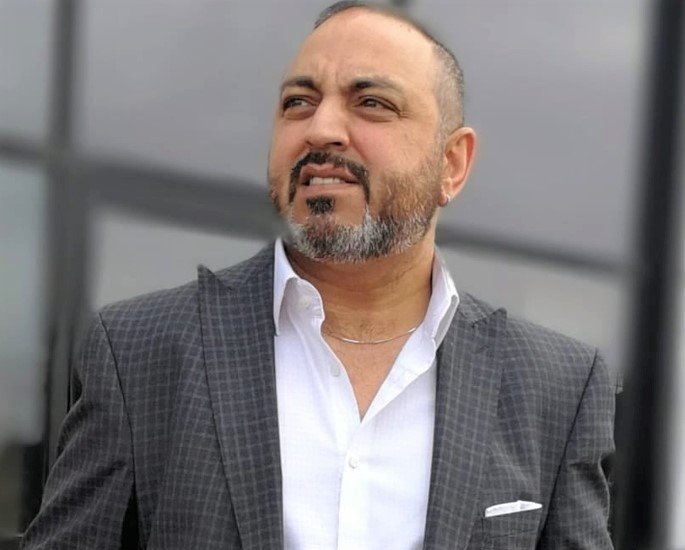
I know it isn’t always easy and often requires more willpower than we have but to talk to someone.
Doesn’t matter if it’s a professional, family member, or friend. Just talk.
Our species suffer from being too proud to say that something isn’t right or that someone has said or done something to upset us.
Start to write your own journey. Everyone has a story in them.
“Just like me, the minute you jot a few lines about your life you will soon realise how strong you are.”
The raw passion that Amo Raju talks with is hypnotic and reinforces the strides he has made for marginalised people.
Walk Like A Man is another tool that Amo has used to highlight the difficulties of living in a world that does not cater to everyone.
The novel is extremely empowering, sensitive, and riveting. It also depicts how challenging it is for men from South Asian backgrounds to talk about such prevalent issues.
It’s not only a compelling look into Amo Raju’s life, but a much-needed device that will spark progressive discussions.
With rave reviews and a daring piece that challenges cultural conceptions, Walk Like A Man is a novel that everyone should sink into.
You can find more about Walk Like A Man here.